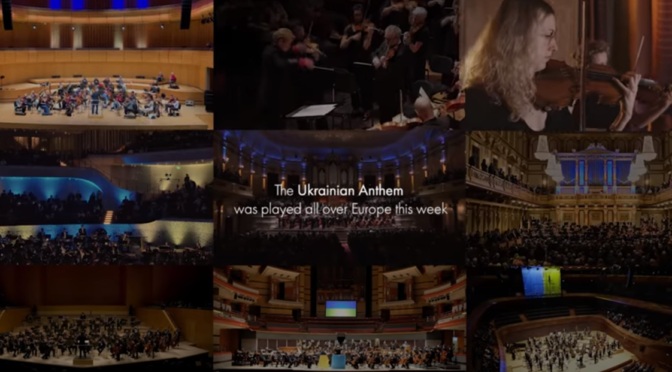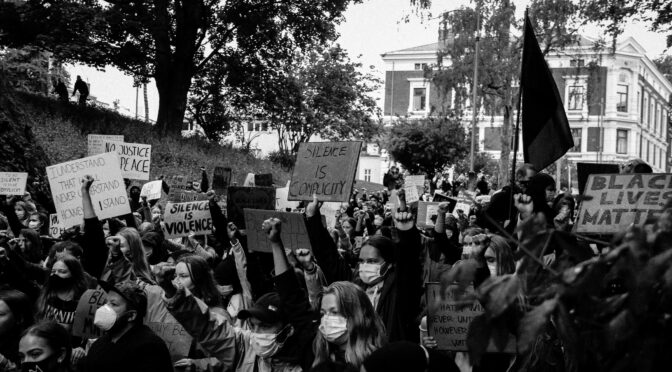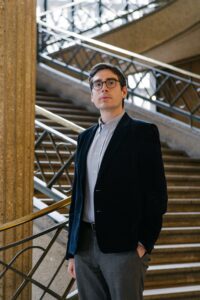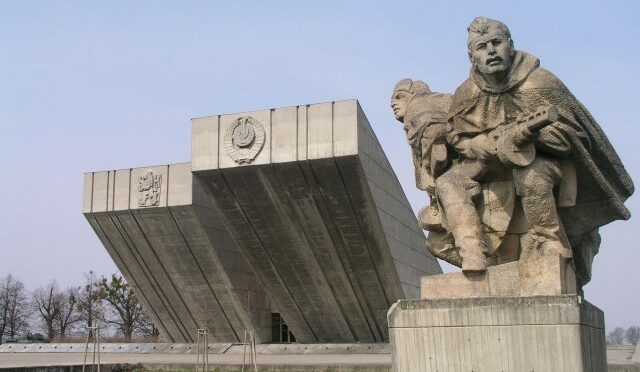Musical Diplomacy and Art Creation in Wartime Ukraine (2014-2024)
An international symposium organized in the frame of the Tandem CNRS-Charles University program at CEFRES by CEFRES, the Institute for musicological research (CNRS-Sorbonne Université), and the Ukraine in a Changing Europe research center at Charles University (IMS FSV UK).
Date: November 27, 2024
Location: CEFRES, Na Florenci 3, Prague 1 (and online)
Deadline for application submissions: July 20, 2024
Selection of papers: August 15, 2024
Language of the symposium: English
Music has always been connected to diplomacy, not necessarily as an auxiliary instrument. Beyond purely aesthetical functions, it has manifold social and political effects. They expand across national and regional borders often transforming the overall image of the country of origin on the global stage. That turns music into a vehicle for cultural diplomacy, at times more efficient in achieving particular objectives, especially when conventional diplomatic means fail (Prévost-Thomas & Ramel 2018; Ahrendt, Ferraguto & Mahiet 2014; Mikkonen & Suutari 2016). Resonant international competitions, like the Eurovision Song Contest, have been rendered major displays of the current geopolitical constellation (Vuletic 2018). States around the globe allocate significant resources to maintaining their cultural institutions abroad, where music, alongside other artistic domains, generates and perpetuates their soft power, which is the power to attract and stimulate to emulate (Nye 2005). The rise in importance of non-state actors in international relations (Cerny 2023) produced a shift towards grassroots initiatives and horizontal networks, where cultural diplomacy is increasingly carried out – both spontaneously and strategically – by actors, not affiliated with state institutions. The notion of musical diplomacy captures all these facets (Gienow-Hecht 2015; Morgan O’Connell, El-Shawan & Castelo-Branco 2010). Placed at the intersection of cultural production and international relations, it taps into this phenomenon where creative and instrumental thinking, spontaneity and purposefulness, official and grassroots streams intertwine and merge.
An overlap between musical production and political resistance has always been indicative of the Ukrainian public scene: from the musical underground in late Soviet times to the iconic songs codifying the core meanings behind the mass protests (Sonevytsky 2019). By co-imagining future-oriented sovereign imaginaries in unison and making them audible, people manifested themselves as sovereign citizens. They created affective ties among themselves and with external observers who sympathize with their cause. Importantly, by the same token, they prefigured and brought about a new political reality. Russia’s full-scale invasion in February 2022 brought new salience to Ukraine’s cultural diplomacy and musical production (Ruble 2023; Sonevytsky 2023). The academic literature exposes the power of music to mobilize a community and provide moral legitimacy at times of war but also how art can be used as a resource for resistance, recovery, and peace-building processes. From the postcolonial perspective, which is one of the conceptual anchors of the symposium, Ukraine’s musical diplomacy elevates the polity’s geocultural status through a chain of subversive acts and strategies that help escape a subaltern position of the double periphery in the former blind spot between the EU and Russia.
The symposium is fundamentally transdisciplinary: it develops at the intersection of musicology, political theory, and cultural anthropology, with a specific focus on postcolonial studies and contentious politics. We welcome theoretical contributions as well as focused case studies presenting research on topics related to musical diplomacy in wartime Ukraine, including, but not limited to, the following:
- Musical diplomacy as a theoretical concept, its potential and limitations
- Factors defining the efficiency of musical diplomacy: agencies, strategies, and contexts
- The dialectics of form and content in musical performance and its perception
- Complex entanglements between musical production and (geo)political developments: reactivity and prefiguration
- State-supported musical initiatives vs grassroots activities and transnational horizontal networks
- Various musical genres and communities engaged in Ukraine’s musical diplomacy
- Case studies: songs, musical bands, events
- Re-discovering Ukraine through its music: external perceptions and receptions
- Entanglements between the postcolonial/subaltern studies and musicology
- Decolonization of musicology and global art community: a fading trend or a pending task?
The symposium will take place on November 27, 2024 at CEFRES in Prague.
Please send abstracts (approx. 300 words) for 20-minute papers and a short biographical note (100-150 words) to the organizers of the conference, Valeria Korablyova (Charles University) at valeriya.korablyova@fsv.cuni.cz and Louisa Martin-Chevalier (Sorbonne University) at louisa.martin-chevalier@sorbonne-universite.fr. The event will result in the publication of a special issue. Draft papers are expected to be prepared and discussed at the symposium. The official language of the workshop and its published proceedings is English.
The submission deadline is July 20, 2024. Applicants will be notified about the acceptance of their proposals by August 15, 2024. Some travel grants will be available. Please include in your application a request if you require financial support from the organizers.
Organizing Committee
Valeria Korablyova (Charles University, Institute of International Studies / CEFRES)
Louisa Martin-Chevalier (IReMus, Sorbonne Université / CEFRES)



 Natalia Marakhovska, an Associate Professor in the
Natalia Marakhovska, an Associate Professor in the 

